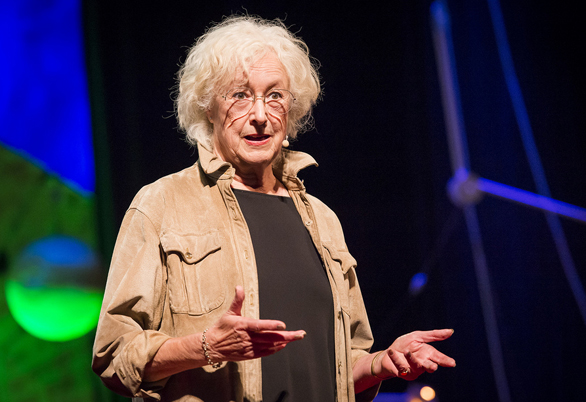
“Accidental theologist” Lesley Hazleton has written a biography of Muhammad. At TEDGlobal 2013, she shares a bold observation about his story. Photo: James Duncan Davidson
The core mystical moment of Islam took place in the year 610, or “half the world and almost half of history away,” as Lesley Hazleton, biographer of Muhammad, puts it. On a hot desert night, this previously ordinary man received the first revelation of the Koran on a mountain outside Mecca.
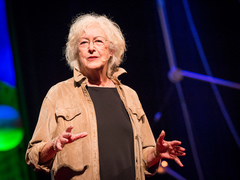 Lesley Hazleton: The doubt essential to faith
“What struck me even more than what happened was not what did not happen,” says Hazleton in today’s talk, given at TEDGlobal 2013. “Muhammad did not come floating off the mountain as though walking on air. He did not run down shouting, ‘Hallelujah. Bless the lord.’ He did not radiate light and joy. There were no choirs of angels, no elation, no ecstasy, no golden aura surrounding him. No sense of an absolute foreordained role as the messenger of God. That is, he did none of the things that might make it easy to cry foul and put down the whole story as a pious fable.”
Lesley Hazleton: The doubt essential to faith
“What struck me even more than what happened was not what did not happen,” says Hazleton in today’s talk, given at TEDGlobal 2013. “Muhammad did not come floating off the mountain as though walking on air. He did not run down shouting, ‘Hallelujah. Bless the lord.’ He did not radiate light and joy. There were no choirs of angels, no elation, no ecstasy, no golden aura surrounding him. No sense of an absolute foreordained role as the messenger of God. That is, he did none of the things that might make it easy to cry foul and put down the whole story as a pious fable.”
No, according to Muhammad’s writings, he was convinced that the moment had to have been a hallucination, or the result of possession. He felt a deep sense of fear and even contemplated ending his life, says Hazleton: “He was overwhelmed not by conviction, but by doubt.”
While Hazleton points out that some Islamic theologians reject these accounts of Muhammad’s doubt, she says that it’s exactly this whirlwind of emotions that brought him alive for her. “It allowed me to begin to see him in full,” says Hazleton, whose biography of him, The First Muslim, was published in January 2013 after five years of research. “The more I thought about it, the more it made sense that he doubted,” she continues. “Because doubt is essential to faith.”
To hear what Hazleton means by this bold statement — and its implications for fundamentalists of all religions — watch this blistering talk, which points out that true faith takes deep internal wrestling. It’s a call for all religions to take back the public ground from hardliners who offer pat answers and dogma in place of an individual struggle with hard questions.
In honor of Hazleton’s powerful talk, below, watch six more talks from TED stages that give surprising, subtle understandings of Islam.
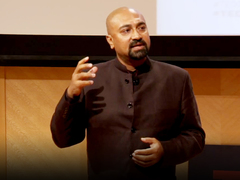 Bobby Ghosh: Why global jihad is losing
Bobby Ghosh: Why global jihad is losing
Bobby Ghosh: Why global jihad is losing To many, the word ‘jihad’ conjures up images of Osama bin Laden. But as Bobby Ghosh shares in his talk at TEDxGeorgetown, this actually demonstrates a misappropriation of a word with deep religious significance. To the vast majority of practicing Muslims, he says, jihad is an internal struggle for the faith — a struggle against vice, sin, temptation, lust and greed, and toward a life outlined in the Koran. So why is the global understanding of the word so different? Because a small minority of believers see jihad as an external struggle, against forces that threaten the faith. Bin Laden was the latest to espouse this view, says Ghosh, and because of his heinous acts, his definition — to wage a war of terrorism on the West — stuck both in the West and in the Muslim world. In this talk, Ghosh looks at how bin Laden took a beautiful idea and corrupted it — and how why his twisted definition will no longer be able to stick. |
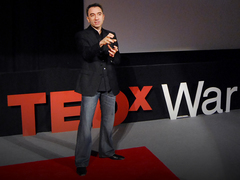 Mustafa Akyol: Faith versus tradition in Islam
Mustafa Akyol: Faith versus tradition in Islam
Mustafa Akyol: Faith versus tradition in Islam When journalist Mustafa Akyol traveled to Mecca, he made an interesting observation — that men and women prayed together at the Kaaba but were separated in a nearby Burger King. In this talk from TEDxWarwick, Akyol suggests that many things thought to be core to Islam — like the separation of the genders and the wearing of headscarves for women — are actually long-held local traditions as opposed to religious doctrine. |
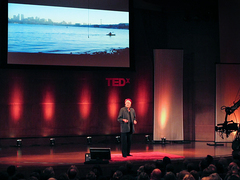 Lesley Hazleton: On reading the Koran
Lesley Hazleton: On reading the Koran
Lesley Hazleton: On reading the Koran In this talk from TEDxRainier, Hazleton describes how she first became interested in Islam, calling herself an “accidental theologist.” One day, she simply decided to sit down and read the Koran; she found herself thoroughly fascinated by what was inside, because it seemed so far from her expectations. In this talk, she shares the insights and complexities she found within in its pages, and shares why it is easy for both Muslim extremists and “Islamaphobes” to take out-of-context Cliffs Notes from the holy book. Bonus: Read the TED Blog’s Q&A with Hazleton from right after this talk in 2010, when Hazleton shared that she was midway through a book that would allow readers “to get a real feel for [Muhammad] as a person.” |
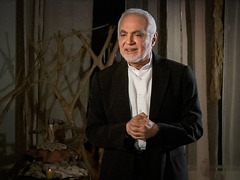 Feisal Abdul Rauf: Lose your ego, find your compassion
Feisal Abdul Rauf: Lose your ego, find your compassion
Imam Faisal Abdul Rauf: Lose your ego, find your compassion The Koran has 114 chapters, and each one begins with “basmala,” a saying which includes the words “In the name of God, the all-compassionate.” Because a Muslim’s mission is to follow in the path of the prophet and take on the attributes of God, this wording is especially meaningful. In this talk from a TED Salon in 2009, Imam Faisal Abdul Rauf looks at the centrality of compassion to Islam, and says that compassion is deeply a part of us. And yet, he also looks at why it is so hard to connect to it – because our egos get in the way. |
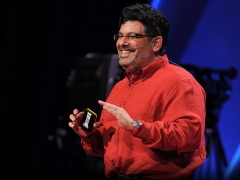 Naif Al-Mutawa: Superheroes inspired by Islam
Naif Al-Mutawa: Superheroes inspired by Islam
Naif Al-Mutawa: Superheroes inspired by Islam In 2010, Superman, Batman and Wonder Woman teamed up with The 99, a band of superheroes who derive their powers from the 99 attributes of Allah. In this talk from TEDGlobal 2010, Al-Mutawa explains why he created these superheroes in his comics: to point out the similarities between superheroes and the prophets, while breaking stereotypes of Islam. By reinforcing positive images of Islam, minus the extremism, Mutawa shares how he hopes to create a cross-cultural framework for confronting evil. |
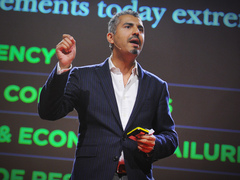 Maajid Nawaz: A global culture to fight extremism
Maajid Nawaz: A global culture to fight extremism
Maajid Nawaz: A global culture to fight extremism Maajid Nawaz is a former Islamic extremist. In this powerful talk from TEDGlobal 2011, he shares his story of how he joined the cause and even became a recruiter for it. His insight? That extremist groups are good at communicating across borders. And that those wishing to spread democracy have a lot to learn from them. |
This post was originally published as a collection of six talks in December of 2012. It was updated to include Hazleton’s latest talk in June of 2013.
Comments (10)
Pingback: Continuing the Conversation | Considering the Options
Pingback: Islam 308
Pingback: Homework for Friday, January 16th | Ms. French ~ Social Studies 8
Pingback: TED Fellow Negin Farsad opens film “The Muslims Are Coming!” | TokNok Multi Social Blogging Solutions
Pingback: 7 fascinating talks on better understanding Islam | Learning English at University College Cork, Ireland
Pingback: හැඳින්වීම
Pingback: 9-11: A National Day of Reconciliation